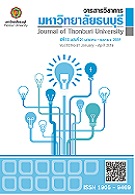หลักนิติธรรมกับสังคมไทย
Keywords:
หลักนิติธรรม, กฎหมาย, การเมืองการปกครอง, สังคมไทย, Rule of Law, Law, Politics, Thai SocietyAbstract
หลักนิติธรรม หรือ Rule of Law เป็นหลักพื้นฐานทางกฎหมายที่สำคัญและเป็นสากล ซึ่งรัฐธรรมนูญแห่งราชอาณาจักรไทย พุทธศักราช 2550 มาตรา 3 วรรค 2 ได้บัญญัติไว้ว่า “การปฏิบัติหน้าที่ของรัฐสภา คณะรัฐมนตรี ศาล รวมทั้งองค์กรตามรัฐธรรมนูญและหน่วยงานของรัฐ ต้องเป็นไปตามหลักนิติธรรม” โดยสาระสำคัญของหลักนิติธรรมประกอบด้วย 1) กฎหมายต้องใช้บังคับเป็นการทั่วไป 2) กฎหมายที่เป็นโทษไม่มีผลบังคับย้อนหลัง 3) การสันนิษฐานว่าผู้ต้องหาบริสุทธิ์จนกว่าจะมีคำพิพากษาถึงที่สุดว่าผิด 4) การเป็นอิสระและเป็นกลางของผู้พิพากษา 5) เจ้าหน้าที่รัฐต้องใช้อำนาจภายใต้กฎหมายที่กำหนดไว้ และ 6) กฎหมายต้องไม่ยกเว้นความผิดให้แก่การกระทำในอนาคต ในสังคมไทยนั้นนักการเมืองมักอ้างว่าได้ใช้หลักนิติธรรมในการบริหารบ้านเมืองและออกกฎหมายต่าง ๆ โดยเป็นไปตามหลักประชาธิปไตยเสียงข้างมากด้วย อย่างไรก็ตาม จะพบการใช้หลักนิติธรรมในด้านกฎหมายเพียงอย่างเดียวนั้นยังไม่สามารถแก้ไขปัญหาที่สำคัญของประเทศไทย อันได้แก่ การบริหารบ้านเมืองอย่างโปร่งใสและมีประสิทธิภาพ การทุจริตคอรัปชั่น และความเหลื่อมล้ำระหว่างคนรวยกับคนจน ดังนั้นสังคมจึงไม่ควรพิจารณาหลักนิติธรรมเฉพาะในแง่หลักพื้นฐานแห่งกฎหมายเพียงมิติเดียว แต่ควรพิจารณาเชื่อมโยงกับมิติอื่น ด้านการเมืองการปกครอง เศรษฐกิจสังคมและสิทธิมนุษยชนไปด้วย เพื่อพัฒนาให้สังคมไทยมีความเจริญก้าวหน้าอย่างยั่งยืนและมีความสุข
RULE OF LAW IN THAI SoCIETY
Rule of Law is the common basis principles of law. The 2007 Constitution of the Kingdom of Thailand states that the Parliament, the Cabinet, the court, including the constitutional bodies and government agencies must adhere to the rule of law in their operation. In essence, the rule of law consist of the following principles: 1) The law requires mandatory grants, 2) Law is not retroactive, 3) The assumption that the accused innocent until the final judgment concluded he is wrong, 4) The independence and impartiality of Judges, 5) State officers exercise authority under the law prescribed, and 6) The Law is not exempted from the action in the future. In Thai society, politicians and governments often clam to use the rule of law in accordance with the principle of democratic majority in their administration and law making. However, it was found that the use of the rule of law in law making alone could not resolve the major problems of Thailand, including issues concerning transparency and inefficiency, corruption, and the gap between the rich and the poor. Therefore, to resort to the rule of law in the process of law making alone is not effective enough to solve the society’s problem, it also must be applied to other aspects of the social life, such as politics, social, economy, and human rights, in order to achieve sustainable development and happiness.







